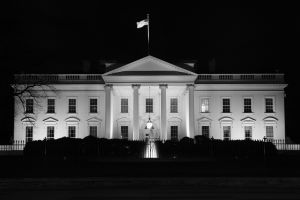Dina Smeltz, Ivo H. Daalder, Karl Friedhoff, Craig Kafura, and Brendan Helm analyze data finding Democrats and Republicans are divided in their views on top threats to United States and how the country should address global challenges and engage internationally.
Divided We Stand: Democrats and Republicans Diverge on US Foreign Policy
Executive Summary
The worldwide spread of COVID-19 has reminded Americans that the United States is not immune to events that take place in other parts of the world. Far from feeding calls to retreat from international engagement, Americans remain supportive of an active US role in the world, with solid majorities supporting US security alliances and free trade as the best ways to maintain safety and prosperity. Most Americans also continue to believe that globalization is largely beneficial for the United States.
But there are profound differences between Democrats and Republicans on which foreign policy issues matter most today. And they are even more sharply divided on how the United States should deal with these issues and engage the rest of the world. Generally speaking, Democrats prefer an internationalist approach: cooperating with other countries, amplifying US participation in international organizations and agreements, and providing aid to other nations. In contrast, Republicans prefer a nationalist approach: putting US interests above those of other countries, creating economic self-sufficiency, and taking a unilateral approach to diplomacy and global engagement (Figure A).
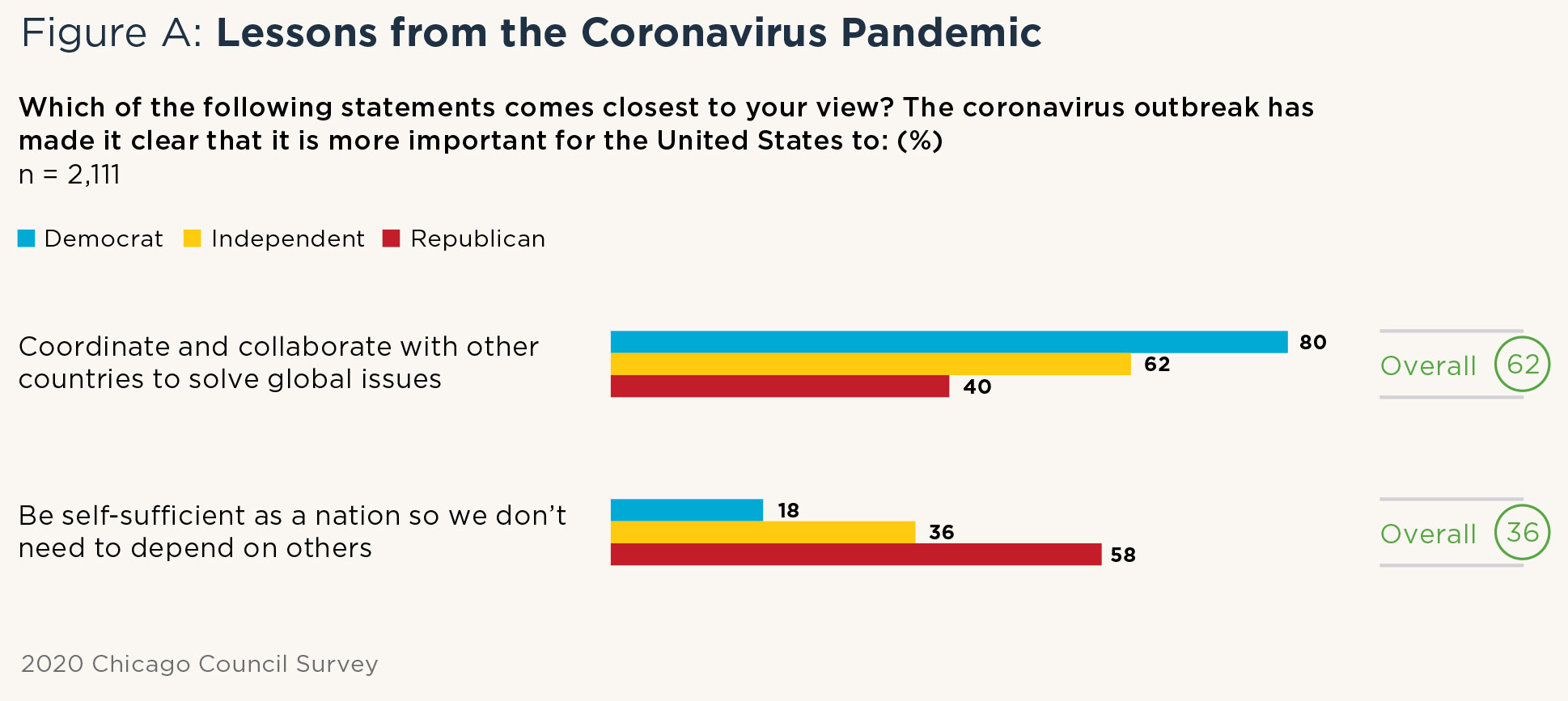
The foreign-policy positions of the two candidates in the upcoming 2020 presidential election mirror this public divide. President Donald J. Trump articulated a clear message favoring nationalism over multilateralism at the 74th United Nations General Assembly in 2019. He noted that the future belongs not to the “globalists” but to the “patriots,” going on to elaborate: “The future belongs to sovereign and independent nations who protect their citizens, respect their neighbors, and honor the differences that make each country special and unique.” 1
This agenda contrasts sharply with that put forth by the Democratic candidate. Former Vice President Joseph R. Biden, Jr. has stated that his foreign policy will embrace the networks of partnerships and alliances the United States has built over the decades to enhance national security and freedom. “Working cooperatively with other nations,” Biden has argued, will “amplify our own strength, extend our presence around the globe, and magnify our impact while sharing global responsibilities with willing partners.” 2
These two perspectives on US engagement in the world are poles apart, and the choices voters make this fall will therefore have far-reaching consequences for the direction of US foreign policy.
Americans Want to Remain Engaged in World, Support Alliances and Trade
COVID-19 reached American shores at the start of 2020 and has inflicted untold damage on both lives and livelihoods. Within eight months, 6 million American citizens have been infected by the virus that causes COVID-19, nearly 190,000 have died from it, and tens of millions have lost their jobs. 3 Despite the pandemic, Americans continue to reject retreat from the world. 4 Instead, Americans across party lines continue to endorse robust US involvement and leadership internationally. Nearly seven in 10 (68%) maintain that the United States should take an active part in world affairs, and 54 percent overall say that the United States should be more involved, not less, in addressing the world’s problems (Figure B).
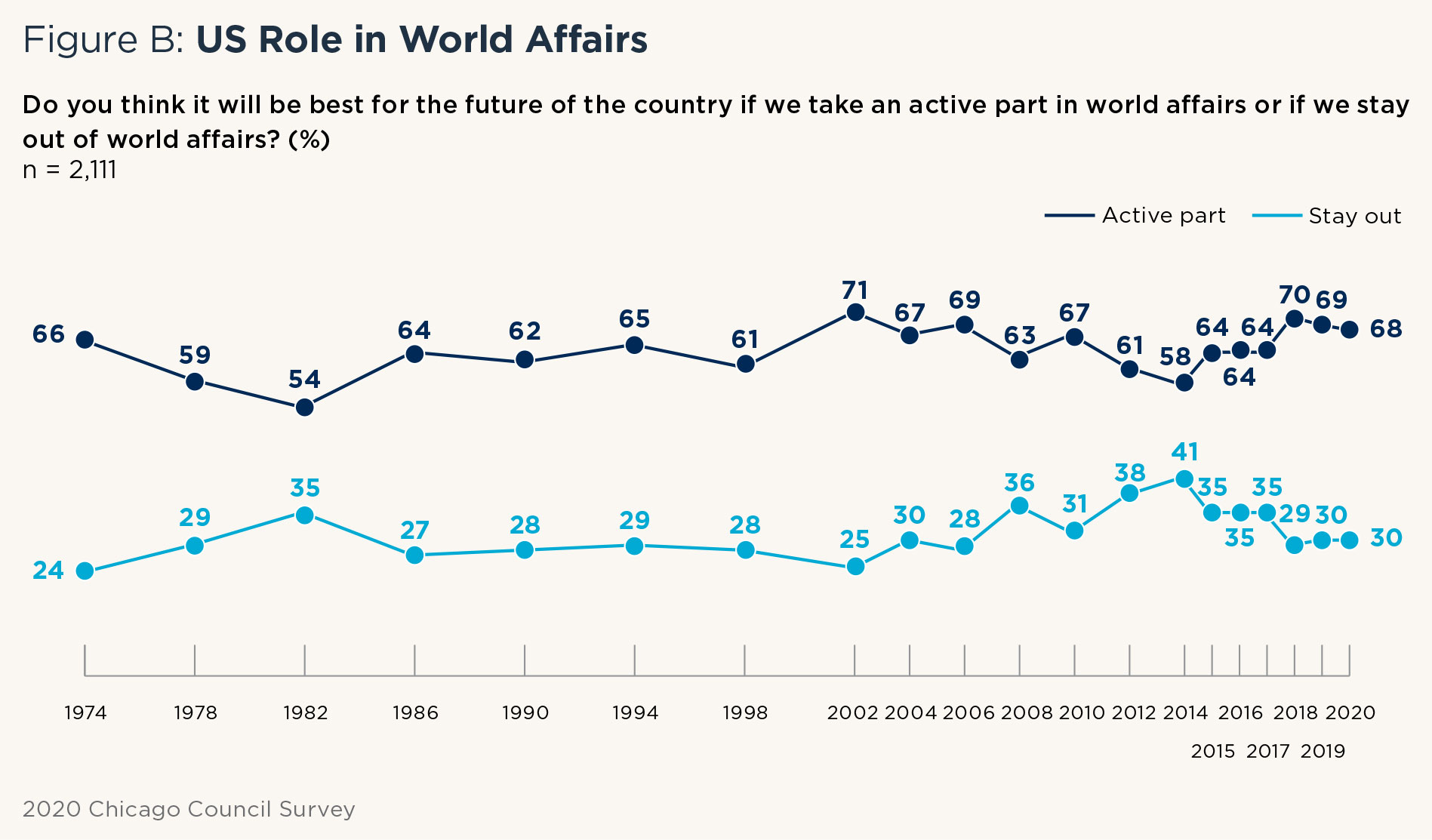
Americans view alliances as a key part of that engagement. Solid majorities continue to say alliances in Europe (68%) and East Asia (59%) mostly benefit the United States as well as its allies. About three-quarters still support maintaining or increasing the US commitment to NATO (73%). Seven in ten Americans (71%) believe that the United States should consult with major allies before making foreign-policy decisions. On each of these questions, majorities of both Democrats and Republicans agree.
The US public also continues to support globalization and free trade (Figure C). Two-thirds of Americans still believe that globalization is beneficial to the United States (65%) and majorities believe that international trade is good for the economy (74%), consumers (82%), improving relations with other countries (85%), and creating jobs (59%) in the United States.
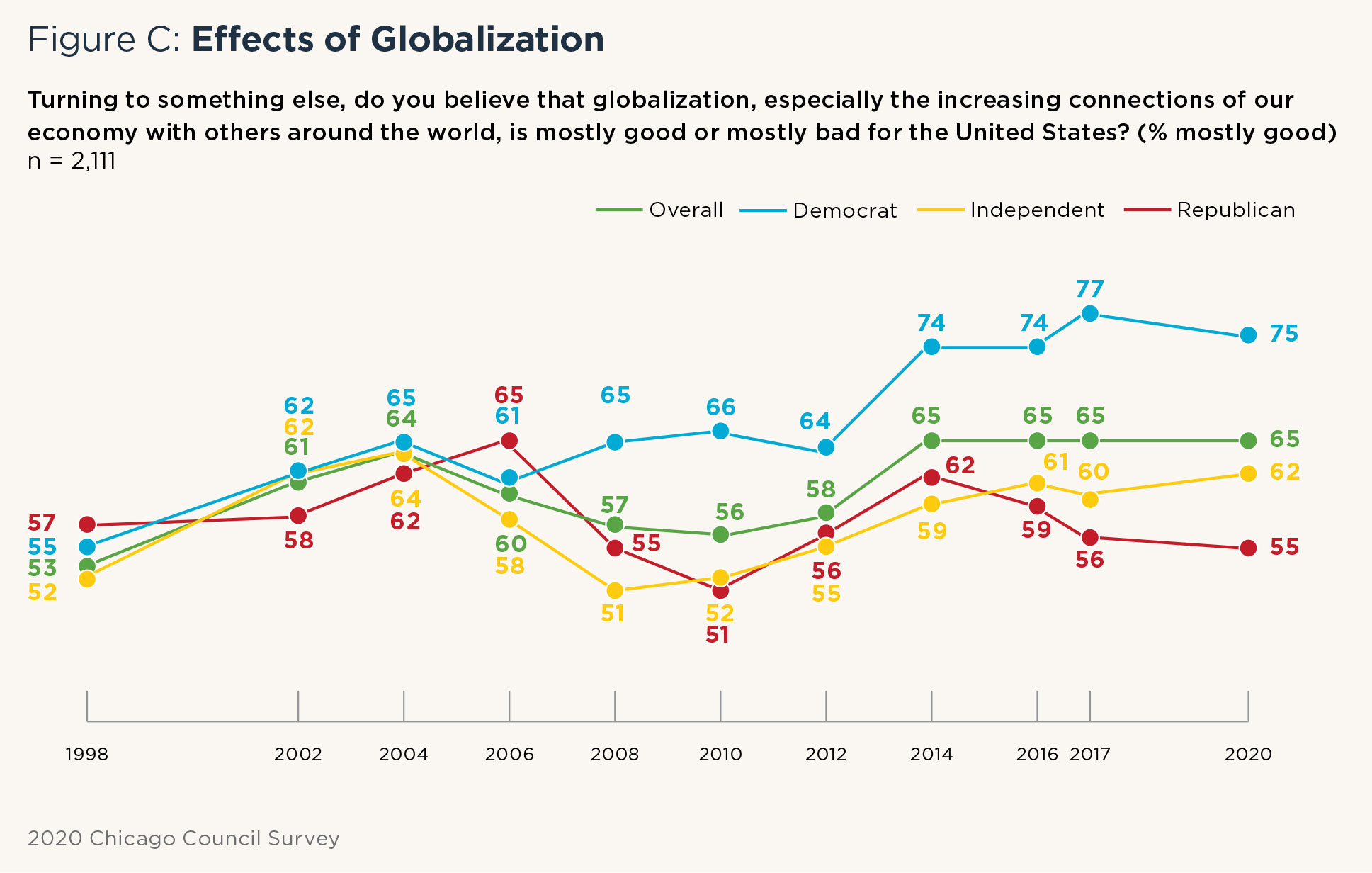
Partisan Differences on Top Threats Facing the Country
When it comes to the most important foreign policy issues affecting the United States, Democrats and Republicans are worlds apart. Democrats are most concerned about global problems such as the COVID-19 pandemic (which 87% see as a critical threat) and climate change (75%), followed by societal issues such as racial inequality (73%) and economic inequality (67%). Furthermore, seven in 10 Democrats are concerned about foreign interference in US elections (69%) (Figure D).
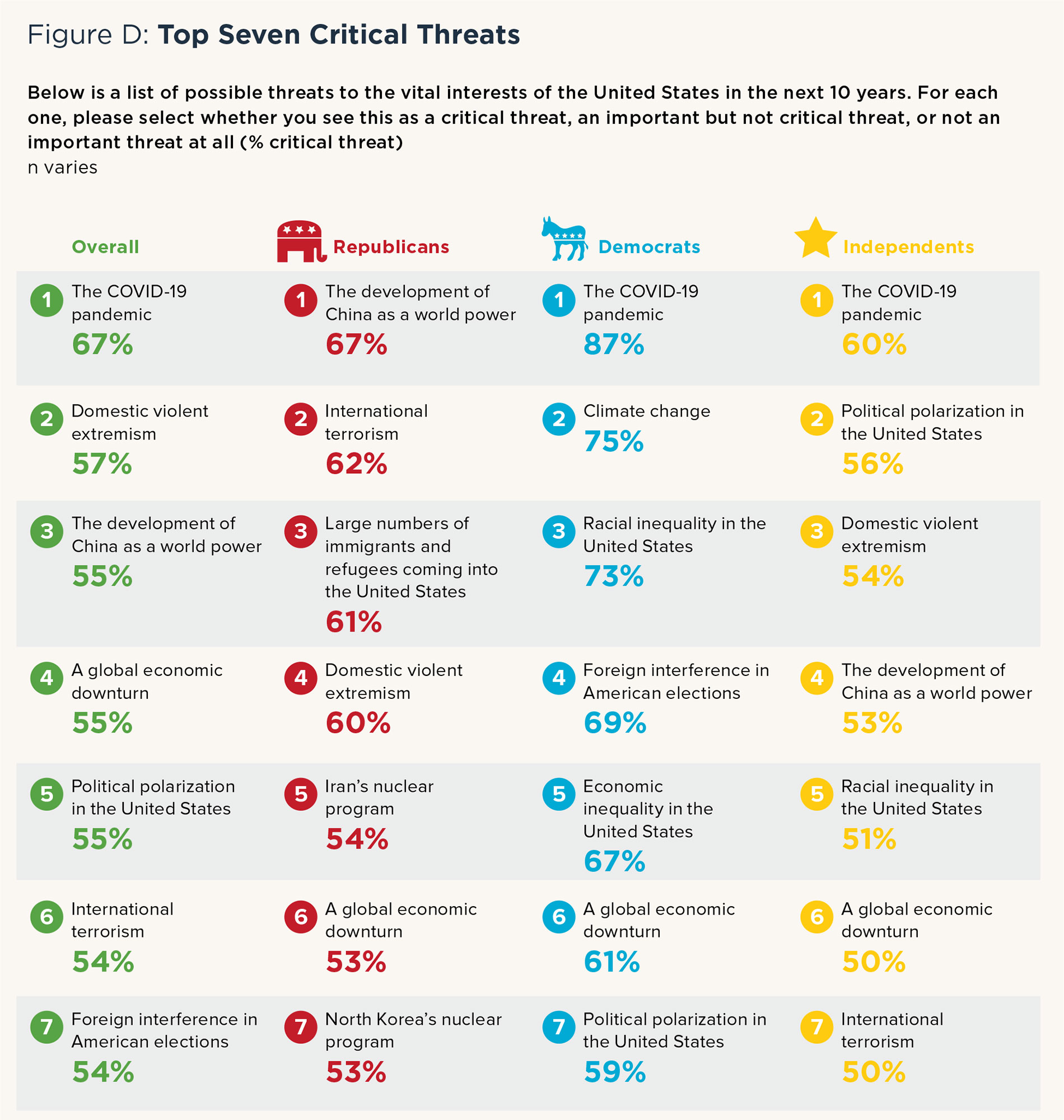
Republicans identify traditional security challenges as the most critical threats facing the country, including the development of China as a world power (67%), international terrorism 5 (62%), and Iran’s nuclear program (54%). Six in 10 also consider large numbers of immigrants and refugees coming into the country (61%) as a critical threat—a long-standing Republican concern.
Thus, there are stark differences in how Democrats and Republicans want US policy to address the most pressing issues facing the country as well as how to engage with the rest of the world.
Democrats Favor an Internationalist Approach: Diplomacy and Cooperation
A vast majority of Democrats (80%) say the COVID-19 outbreak has increased the importance of the United States coordinating and collaborating with other countries to solve global issues. Democrats’ strong support for working through international organizations is likely rooted in the belief that the United States is no greater a country than others (64%)—a sentiment that has grown dramatically since 2017, when just 43 percent agreed (Figure E).
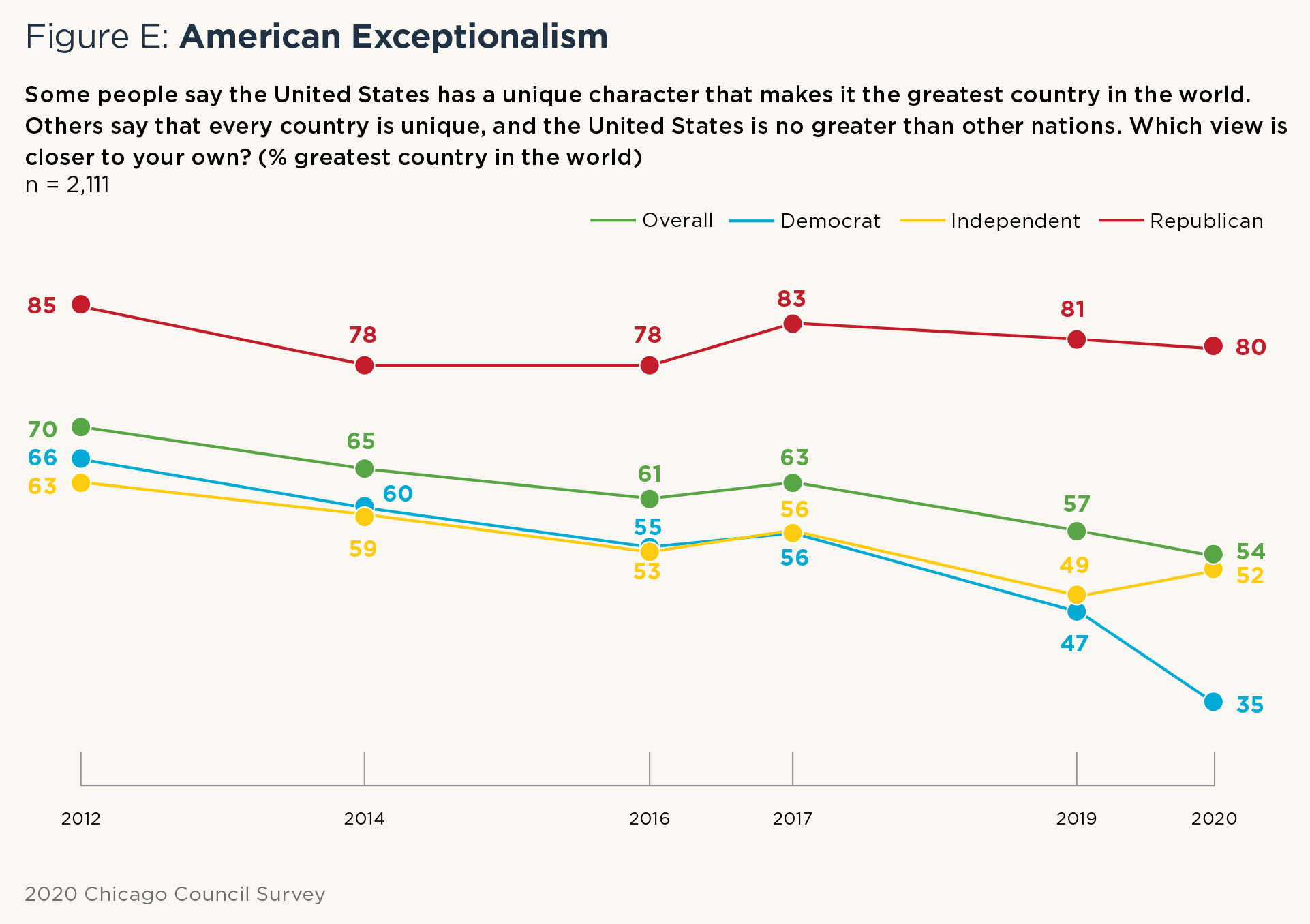
Democrats also strongly advocate addressing global problems by working within the international community, pursuing solutions such as increasing US participation in international organizations (63%), providing humanitarian aid (59%), and signing international agreements (55%). They also say that international organizations should be more involved, including the World Health Organization (71%), the United Nations (68%), and the World Trade Organization (53%). Compared with Republicans, they are more likely to strongly agree that “problems like climate change and pandemics are so big that no country can solve them alone, and international cooperation is the only way we can make progress in solving these problems” (72% of Democrats strongly agree, compared to 36% of Republicans).
One example is China. Despite the shared view among both Democrats and Republicans that Beijing is an unfair trade partner and mostly a rival to Washington, DC, most Democrats still favor a strategy of engagement over containment. In fact, six in 10 Democrats (60%) say that the United States should pursue friendly engagement with China. Asked about specific policy proposals regarding China, a majority of Democrats oppose restricting the exchange of scientific research between the United States and China (57%) or limiting the number of students from China studying in the United States (64%).
Democrats’ attitudes toward trade also reflect an internationalist orientation. A large majority of Democrats (75%) support the global production of various goods across several countries to ensure that a crisis or disaster does not hurt the supply of goods around the world. Only 24 percent favor the United States producing all its own goods. Seven in 10 Democrats (70%) also prefer that the United States coordinate the production of goods with other countries, even at the risk of having to rely on those countries if shortages arise. Just 28 percent of Democrats say that the United States should produce all its critical goods to ensure domestic supply, even if this means higher prices for US consumers.
Recent administrations, both Democratic and Republican, have favored the use of sanctions as an economic stick—but three in 10 Democrats (30%) think the United States should decrease the use of sanctions against other countries. This extends to placing tariffs on products imported from China, which 56 percent of Democrats oppose.
Republicans Favor a Nationalist Approach: Self-Sufficiency and Independence
In contrast to the Democrats, a majority of Republicans (58%) believe the COVID-19 outbreak has made it more important for the United States to be self-sufficient as a nation. This perspective likely rests upon the idea that the United States is exceptional: 80 percent of Republicans say that the United States is the greatest country in the world, and close to half of Republicans (48%) agree that “the United States is rich and powerful enough to go it alone, without getting involved in the problems of the rest of the world.”
Republican views in favor of self-sufficiency are a function of their commitment to upholding US independence and sovereignty in international affairs. A majority of Republicans (61%) reject the idea that the United States should be more willing to make decisions within the United Nations if it means pursuing a policy that is not its first choice, putting them at direct odds with 84 percent of Democrats. In further contrast to Democrats, there is no Republican majority support for any international organization to be more involved in addressing the world’s problems.
Republicans identify China as a higher critical threat than any other threat presented in the survey (67%), and a significant majority say that the United States should actively seek to limit China’s power and influence (64% versus 36% of Democrats). Republicans also support squeezing people-to-people exchanges with China: two-thirds are in favor of limiting the number of students from China in the United States (65%) and restricting the exchange of scientific research between the two countries (66%).
Perhaps because of their focus on security threats, Republicans favor more muscular approaches to addressing international challenges. To combat terrorism (which 62% of Republicans say is a critical threat), nearly nine in 10 Republicans (87%) want to increase or maintain the use of drone strikes against suspected terrorists. Republicans also support those same aggressive measures at home, with majorities supporting using US troops to suppress domestic protests (59%) and riots, looting, and vandalism (83%). Two in three also support an increase in funding for immigration enforcement (64%).
On trade, Republicans tend to favor protectionist policies. Two-thirds of Republicans (60%) prefer the United States produce its own critical goods to ensure domestic supply rather than buying or selling overseas (versus 37% who want to coordinate production globally). However, Republicans are more divided on the best approach in a crisis or a disaster. About half of Republican supporters favor individual countries producing the goods they need (47%), while the other half favor many countries producing goods that are traded internationally (51%).
On trade with China, Republican preferences are the inverse of Democratic preferences. Majorities of Republicans support increasing tariffs on products imported from China (76%), and seven in 10 (70%) support significantly reducing trade between the US and China, even if this leads to greater costs for American consumers.
Conclusion
In recent years, commentators have questioned whether the American public is committed to remaining involved in world affairs or whether the country is drifting toward isolationism. But this isn’t the most relevant question, as a majority of Americans continue to support global engagement. Rather, the most important question is how the United States should relate to the rest of the world. President Trump’s foreign policy is largely based on the importance of “America First,” emphasizing the central role of nationalism and sovereignty in US relations with other countries. In contrast, Biden has emphasized the importance of working with other countries to address global challenges such as COVID-19 and climate change. While these ideas no doubt reflect the candidates’ perspectives on how the United States should engage the world, they’re perfectly tailored to appeal to their respective constituencies.
While Democratic and Republican presidential candidates have had some foreign policy differences in past elections, the differences have often been at the margins and within a common view of the international role of the United States as well as the threats the country faces. Today, the differences between the two candidates are glaring, reinforced by respective partisan preferences among the wider public. In November, voters will not only decide who will become the next US president but also they will help determine the path US foreign policy takes—either working in partnership with the international community or moving toward a greater degree of national self-reliance.
Methodology
This report is based on the results of a survey commissioned by the Chicago Council on Global Affairs. The 2020 Chicago Council Survey, a project of the Lester Crown Center on US Foreign Policy, is the latest in a series of wide-ranging surveys on American attitudes toward US foreign policy. The survey was conducted from July 2 to July 19, 2020, among a representative national sample of 2,111 adults. The margin of sampling error for the full sample is +/– 2.3 percentage points, including a design effect of 1.2056. The margin of error is higher for partisan subgroups or for partial-sample items.
- 1Donald J. Trump, “Remarks by President Trump to the 74th Session of the United Nations General Assembly,” Whitehouse.gov, September 24, 2019, whitehouse.gov
- 2Joseph R. Biden, Jr, “Why America Must Lead Again: Rescuing U.S. Foreign Policy After Trump,” Foreign Affairs, March/April 2020, foreignaffairs.com.
- 3Eli Rosenberg, “U.S. economy added 1.8 million jobs in July as it worked to recover from the coronavirus pandemic,” Washington Post, August 7, 2020, washingtonpost.com.
- 4Dina Smeltz, Ivo Daalder, Karl Friedhoff, Craig Kafura, and Brendan Helm, “Rejecting Retreat: Results of the 2019 Chicago Council Survey,” The Chicago Council on Global Affairs, September 9, 2019, thechicagocouncil.org.
- 5International terrorism and domestic violent extremism are also viewed by a majority of Democrats as critical threats, but they do not rate these as highly relative to other threats as Republicans do.
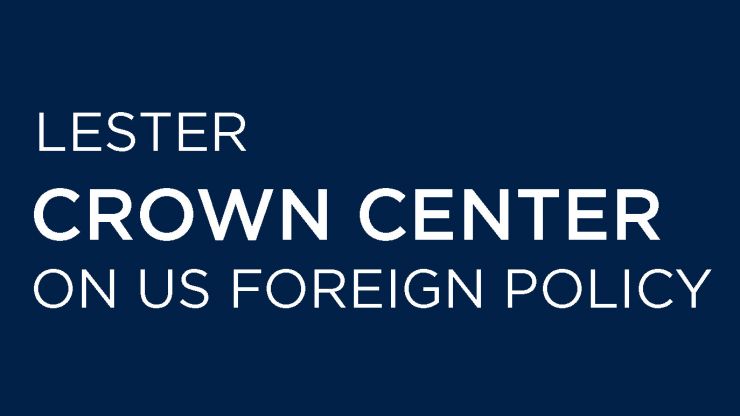










Related Survey Briefs
- Do Republicans and Democrats Want a Cold War with China?
- Americans Positive on South Korea Despite Trump’s Views on Alliance
- Republican Views on Racial Inequality Starkly Contrast Those of Democrats
- Republicans, Democrats Divided over Federal Spending Priorities
- Republicans, Democrats Split on Increasing US Defense Budget
- Divisions on US-China Policy: Opinion Leaders and the Public

